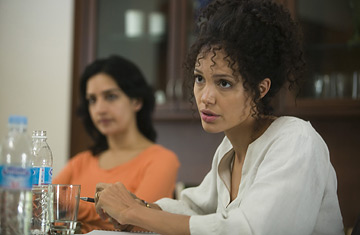
Angelina Jolie as Mariane Pearl in A Mighty Heart.
For many of us, the horrendous murder of Wall Street Journal reporter Daniel Pearl in Karachi, Pakistan, in 2002 remains the signature event in the war on terror. The deaths at the World Trade Center left us with indelible images of mass destruction, but the victims of 9/11 were essentially anonymous. Even today we don't know much about most of them. About Pearl, however, we quickly came to know a great deal: a principled and hard-driving journalist, loving husband, happily expectant father. He was, by all accounts, a good man. Perhaps too good for his own good, in that he innocently failed to take minimal precautions when he set forth to interview a terrorist he thought might have new information about Richard Reid, the infamous "shoe bomber."
A Mighty Heart, based on the book Pearl's wife Mariane wrote about the huge and increasing desperate attempt to find Pearl before his kidnappers assassinated him, is a conscientious and in many respects admirable account of this effort. Directed by Michael Winterbottom (Welcome to Sarajevo, A Cock and Bull Story) in the semi-documentary manner he favors — hand-held cameras, lightly rehearsed staging, considerable improvised dialogue — it has great immediacy and it tells a complex story very coherently. A bewildering number of institutions — Pakistani security forces, the American consulate in Karachi, Pearl's newspaper, even the FBI — turned the Pearl home into a command center from which they pursued any number of leads, both frustrating and promising, generally in an optimistic and cooperative spirit.
This effort was coordinated by Mariane herself and Angelina Jolie is wonderful in the part. Visibly pregnant, surrendering to despair only in private, sometimes angry, but usually upbeat and commonsensical, we gain an extraordinary sense of a woman hiding her vulnerability, her essential aloneness at the center of the storm, beneath a consistently positive manner. This woman is never, seemingly, out of control. How difficult that must have been is underscored by Winterbottom's portrayal of Karachi. The word "teeming" does not begin to describe this huge and jumbled urban mass, this warren of narrow traffic-clogged streets. Who is a friend? Who is an enemy? Who is corruptible, who is not? The idea of finding a kidnapped man in that environment seems to us hopeless.
As, alas, it turns out to be. It also turns out to be the insuperable problem A Mighty Heart cannot solve. If this were a fictional film in which the possibility of rescue remains alive until the end, the possibilities for suspense would be endless and ever-tightening. But the sad fact is that we know Danny Pearl's fate before we enter the theater. Fascinating as these characters are, interesting as the events of its chase often are, we cannot escape the fact that the movie's ending is known to us, that history's course cannot be altered. We can (and do) admire Mariane's courage, the patient tenacity of the "The Captain" (Irrfan Khan) the lead Pakistani investigator, the sweetness of Dan Futterman's portrayal of Danny Pearl. But what we have, in essence, is a kind of police procedural in which the procedures do not bear fruit.
Or at least not the fruit we desperately want, which is the victim's safe return. Ironically, Danny's murderers were eventually found, tried and punished; although we can take muted pleasure in that fact, it does not really satisfy us. We can, as well, admire his widow carrying on, building a new life, which includes creation of a foundation that seeks to protect endangered journalists everywhere (some 250 of them have lost their lives in action since Pearl's death). But again that cannot quite compensate us for our disappointment in this earnest, well-made, consistently interesting chronicle of death we know to be foretold. A degree of guilt shadows that judgment. One seems to be calling for mere narrative satisfaction from a film that has more serious matters on its mind. But this movie does not fully separate itself from our admittedly low — even slightly shameful — expectations, does not become the pure documentary it might perhaps better have been.
